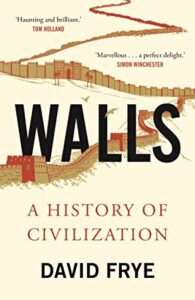 Walls: A History of Civilization in Blood and Brick, David Frye
Walls: A History of Civilization in Blood and Brick, David Frye
This book has one major thesis, which it argues fairly well: walls made civilisation possible. Walls are contrasted against wars, with warmongers living a more day-to-day existence and wall-builders creating culture, politics, philosophy, technology, etc. As you read it, at least, it seems pretty convincing — but of course, Frye chooses his examples carefully, and doesn’t provide any counter-arguments of times and places where people created art without being walled in, had complex social contracts that allowed for safety and self-expression without carefully delineated borders.
I don’t have the historical knowledge to properly argue the point, but I suspect that Frye’s version is pretty lopsided. I don’t want to romanticise unwalled cultures either, but by and large humans are more complicated than simple dichotomies like this.
Still, I found it an entertaining survey of world cultures where this did seem to play out, and it’s certainly a very readable book. I wish he’d gone more into the modern relevance of walls, but I don’t think it much suited his thesis to discuss Trump’s wall — hardly a beacon of culture-creation — at great length.

Leave a Reply